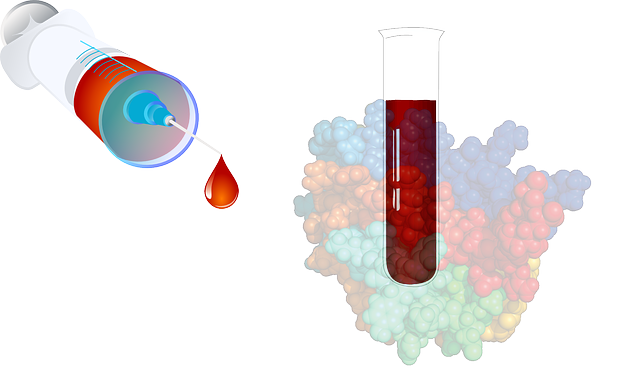Iron deficiency anemia, characterized by low red blood cells, often results from iron intake issues or absorption problems. Symptoms include fatigue and joint pain. Early detection is crucial, with the Vitamin B12 Blood Test UK identifying potential deficiencies alongside iron assessments. This test measures B12 levels, vital for red blood cell formation; low B12 indicates a deficiency contributing to anemia. Healthcare professionals interpret results, guiding personalized treatments like dietary changes or injections. Continuous monitoring and preventive measures are recommended to avoid future deficiencies.
“Iron deficiency anemia, a common yet often overlooked health concern, can be effectively diagnosed using targeted blood tests. This article explores an essential aspect of understanding anemia—Vitamin B12 blood tests in the UK. We delve into how these tests reveal iron levels and identify potential deficiencies, offering crucial insights for accurate diagnosis and treatment. From recognizing symptoms to interpreting test results, this guide empowers individuals to navigate their health journey with confidence.”
- Understanding Iron Deficiency Anemia and Its Symptoms
- The Role of Vitamin B12 in Blood Tests for Iron Deficiency
- How to Interpret Results and Next Steps After a Vitamin B12 Blood Test UK
Understanding Iron Deficiency Anemia and Its Symptoms
Iron deficiency anemia is a common blood disorder where the body lacks enough healthy red blood cells, which are responsible for carrying oxygen to various parts of the body. This condition often results from inadequate iron intake or impaired absorption, leading to reduced hemoglobin production. Symptoms can include fatigue, weakness, pale skin, shortness of breath, dizziness, and headaches. In severe cases, individuals may experience rapid heartbeat, poor appetite, and even joint pain. Early detection is crucial, and a simple blood test can help identify this condition.
One common diagnostic tool is the Vitamin B12 Blood Test UK, which assesses the level of vitamin B12 in the bloodstream. Since iron and vitamin B12 play complementary roles in maintaining healthy red blood cells, this test can provide valuable insights into potential anemia. If iron deficiency is suspected, healthcare professionals may recommend further tests to confirm the diagnosis and determine the underlying cause.
The Role of Vitamin B12 in Blood Tests for Iron Deficiency
In the context of iron deficiency anemia, Vitamin B12 plays a crucial role in blood tests as it is integral to red blood cell formation and overall hematological health. The Vitamin B12 blood test UK has become an essential tool for diagnosing anemia and identifying potential nutritional deficiencies. This test measures the level of vitamin B12 in your blood, which is vital for maintaining healthy red blood cells. Low levels of B12 can indicate a deficiency that contributes to anemia, as it impairs the production of red blood cells, leading to fatigue and other symptoms.
For accurate diagnosis, healthcare professionals often recommend combining the Vitamin B12 blood test with other comprehensive anemia assessments. This approach ensures a thorough evaluation of iron status, as vitamin B12 deficiency can coexist or be mistaken for iron deficiency anemia. Understanding the interplay between these nutrients is key to effective treatment and management strategies, ensuring patients receive tailored care based on their specific laboratory results.
How to Interpret Results and Next Steps After a Vitamin B12 Blood Test UK
After your Vitamin B12 Blood Test UK, interpreting the results is crucial to understanding your next steps. If the test indicates a deficiency, it’s important to discuss the findings with your healthcare provider. They will consider factors such as your diet, age, and overall health to determine the best course of action. Treatment may include dietary changes, supplements, or injections, depending on the severity of the deficiency.
The next steps could involve further testing to monitor your Vitamin B12 levels over time or adjusting your treatment plan based on ongoing symptoms and blood test results. Your healthcare provider might also suggest ways to prevent future deficiencies, such as ensuring a balanced diet rich in Vitamin B12-containing foods or regular supplementation if recommended.
Iron deficiency anemia can be effectively diagnosed and managed through targeted blood tests, particularly those that include a Vitamin B12 assessment. Understanding the symptoms and interpreting test results are crucial steps in determining the next course of action. For individuals in the UK seeking clarification on their Vitamin B12 blood test results, consulting with healthcare professionals is advised to ensure proper treatment and address any underlying deficiencies.
